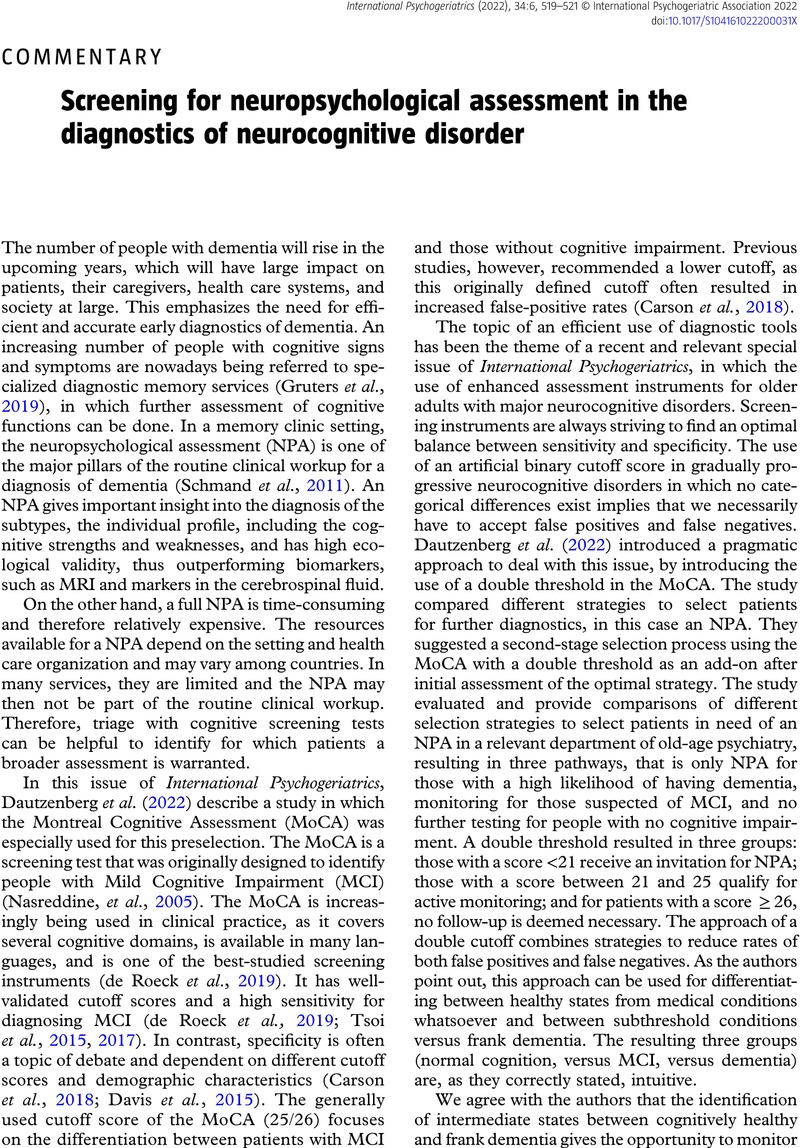No CrossRef data available.
Article contents
Screening for neuropsychological assessment in the diagnostics of neurocognitive disorder
Published online by Cambridge University Press: 25 March 2022
Abstract
An abstract is not available for this content so a preview has been provided. Please use the Get access link above for information on how to access this content.

- Type
- Commentary
- Information
- International Psychogeriatrics , Volume 34 , Special Issue 6: Issue Theme: New Studies of Mild Cognitive Impairment , June 2022 , pp. 519 - 521
- Copyright
- © International Psychogeriatric Association 2022
References
Boccardi, M., et al. (2022). Harmonizing neuropsychological assessment for mild neurocognitive disorders in Europe. Alzheimer’s and Dementia, 18, 29–42. DOI 10.1002/alz.12365.10.1002/alz.12365CrossRefGoogle ScholarPubMed
Carson, N., Leach, L. and Murphy, K. L. (2018). A re-examination of Montreal Cognitive Assessment (MoCA) cutoff scores. International Journal of Geriatric Psychiatry, 33, 379–388.10.1002/gps.4756CrossRefGoogle ScholarPubMed
Coen, R. F., Robertson, D. A., Kenny, R. A. and King-Kallimanis, B. L. (2016). Strengths and limitations of the MoCA for assessing cognitive functioning: findings from a large representative sample of Irish older adults. Journal of Geriatric Psychiatry and Neurology, 29, 18–24.10.1177/0891988715598236CrossRefGoogle ScholarPubMed
Costa, A. et al. (2017). The need for harmonisation and innovation of neuropsychological assessment in neurodegenerative dementias in Europe: consensus document of the Joint Program for Neurodegenerative Diseases Working Group. Alzheimer’s Research and Therapy, 9, 27. DOI 10.1186/s13195-017-0254-x.10.1186/s13195-017-0254-xCrossRefGoogle ScholarPubMed
Dautzenberg, G. M., Lijmer, J. G. and Beekman, A. T. (2022). The Montreal Cognitive Assessment (MoCA) with a double threshold: improving the MoCA for triaging patients in need of a neuropsychological assessment. International Psychogeriatrics, 34, 571–583. DOI 10.1017/S1041610221000612.Google Scholar
Davis, D. H., Creavin, S. T., Yip, J. L., Noel-Storr, A. H., Brayne, C. and Cullum, S. (2015). Montreal Cognitive Assessment for the diagnosis of Alzheimer’s disease and other dementias. Cochrane Database of Systematic Reviews, 10, CD010775. DOI 10.1002/14651858.CD010775.pub2.Google Scholar
de Roeck, E. E., De Deyn, P. P., Dierckx, E., Engelborghs, S. (2019). Brief cognitive screening instruments for early detection of Alzheimer's disease: a systematic review. Alzheimer's Research & Therapy 11
(1), 21. DOI 10.1186/s13195-019-0474-3.10.1186/s13195-019-0474-3CrossRefGoogle ScholarPubMed
de Vugt, M. E. and Verhey, F. R. J. (2013). The impact of early dementia diagnosis and intervention on informal caregivers. Progress in Neurobiology, 110, 54–62.10.1016/j.pneurobio.2013.04.005CrossRefGoogle ScholarPubMed
Gruters, A. A. A. et al. (2019). Development of memory clinics in the Netherlands over the last 20 years. International Journal of Geriatric Psychiatry, 34, 1267–1274.10.1002/gps.5132CrossRefGoogle ScholarPubMed
Jansen, W. J. et al. (2017). The diagnostic and prognostic value of neuropsychological assessment in memory clinic patients. Journal of Alzheimer’s Disease, 55, 679–689. DOI 10.3233/JAD-160126.10.3233/JAD-160126CrossRefGoogle ScholarPubMed
Kalligerou, F. et al. (2020). Assessing functional status using the IADL-extended scale: results from the HELIAD study. International Psychogeriatrics, 32, 1045–1053. DOI 10.1017/S1041610219001091.10.1017/S1041610219001091CrossRefGoogle ScholarPubMed
Luxenberg, J. S. (2020). Potential benefit from extension of IADL scale. International Psychogeriatrics, 32, 1013–1014. DOI 10.1017/S1041610219001546.10.1017/S1041610219001546CrossRefGoogle ScholarPubMed
Nasreddine, Z. S. et al. (2005). The Montreal Cognitive Assessment, MoCA: a brief screening tool fot mild cognitive impairment. Journal of the American Geriatrics Society, 53, 695–699. DOI 10.1111/j1532-5415.2005.53221.x.10.1111/j.1532-5415.2005.53221.xCrossRefGoogle Scholar
Nguyen, A. T. and Lee, G. J. (2020). Cognitive screening for early detection of mild cognitive impairment. International Psychogeriatrics, 32, 1015–1017.10.1017/S1041610219000991CrossRefGoogle ScholarPubMed
Ramakers, I. H. et al. (2020). Monodisciplinaire richtlijn. Tijdschrift voor Neuropsychologie, 15, 91–105.Google Scholar
Schmand, B., Eikelenboom, P., van Gool, W. A. and ADNI (2011). Value of neuropsychological tests, neuroimaging, and biomarkers of diagnosing Alzheimer’s disease in younger and older age cohorts. Journal of American Geriatric Society, 59, 1705–1710. DOI 10.1111/j.1532-5415.2011.03539.x.10.1111/j.1532-5415.2011.03539.xCrossRefGoogle ScholarPubMed
Tsoi, K. K., Chan, J. Y., Hirai, H. W., Wong, S. Y. and Kwok, T. C. (2015). Cognitive tests to detect dementia: a systematic review and meta-analysis. JAMA Internal Medicine, 175, 1450–1458. DOI 10.1001/jamainternmed.2015.2152.10.1001/jamainternmed.2015.2152CrossRefGoogle ScholarPubMed
Tsoi, K. K. F. et al. (2017). Recall tests are effective to detect mild cognitive impairment: a systematic review and meta-analysis of 108 diagnostic studies. Journal of the American Medical Directors Association, 18, 807. DOI 10.1016/j.jamda.2017.05.016.10.1016/j.jamda.2017.05.016CrossRefGoogle ScholarPubMed




